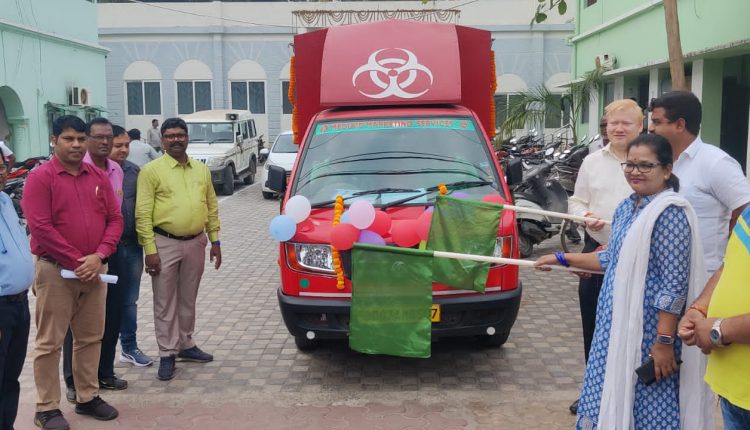Bio-Medical Waste Management For BeMc Health Centres In Odisha’s Berhampur

Berhampur: Berhampur Municipal Corporation (BeMC) launched a special vehicle for bio-medical waste management including collection, transportation, treatment and disposal of clinical wastes from its 8 urban primary health centres and 6 urban health dispensaries on Wednesday.
Mayor Sanghamitra Dalei and BeMC Commissioner J Sonal flagged off the vehicle in the BeMC complex to haul away their bio-medical waste. BeMC has inked an agreement with Bhubaneswar based company Mediaid Marketing Services for the purpose.
The bio-medical wastes of urban primary health centres situated at Uttaramukhi, Aga Sahi, Aska Road, Baikuntha Nagar, Red Cross, Khodasingi, Ambapua and Haridakhandi and urban health dispensaries situated at Minakshi Nagar, Tulsi Nagar, Gosaninuagaon, Ankuli, Ambapua and Haridakhandi were buried in separate deep well earlier.
These health centres generate about 500 kilo bio-medical wastes every day.
“We would transport the bio-medical wastes from these health centres daily to our incinerator plant at Arakhapada in Seragada about 45 km from Berhampur to dispose it completely,” said Rabi Narayan Pasupalak, a partner of Mediaid Marketing Service which is in service since last 15 years.
We are having a 7-tons capacity incinerator plant at Arakhapada and 8 such special vehicles for bio-medical waste management. We are also collecting bio-medical waste from 10 private hospitals and nursing homes in Berhampur.
According to Health Department sources, the number of private clinics and hospitals in Ganjam is 170 including 140 in Berhampur city. But the bio-medical waste management in these private healthcare centres is yet to be systematic, sources said.
Bio-medical wastes (BMW) are generated from health care activities and have the potential to spread diseases. Bio-medical waste means any waste, which is generated during the diagnosis, treatment or immunization of human beings or animals or research activities pertaining thereto or in the production or testing of biological or in health camps. Bio Medical waste includes all the waste generated from the Health Care Facility which can have any adverse effect to the health of a person or to the environment in general if not disposed properly.
All such waste which can adversely harm the environment or health of a person is considered as infectious and such waste has to be managed as per Bio-Medical Wastes Management (BMWM) Rules, 2016, which have laid down norms for storage, treatment and disposal of BMWs.
Disposable contaminated waste which can be recyclable-will be disposed by autoclaving treatment followed by shredding, Tubing, Bottles, Intravenous tubes and sets, Catheters, Urine bags, Syringes (without needles and fixed needle syringes), Vaccutainers with their needles cut and gloves and can be segregated accordingly.
Human anatomical wastes, body parts / tissues etc., cotton dressings, plaster, casts, gauze pieces, antibiotics and other drugs, microbiology waste, culture devices, stocks or specimen, microorganisms,discarded linens, mattresses, dressings soiled with blood or body fluids, routine masks and gown also pose problem.
Glassware including broken, contaminated glass, medicine vials, ampoules etc are also regarded as bio-medical waste.

Comments are closed.